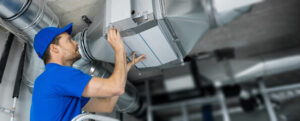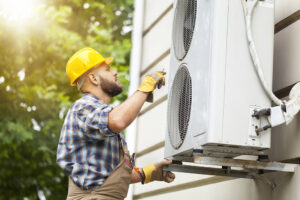HVAC repair technicians inspect, maintain, and fix heating units, air conditioners, ductwork, thermostats, and fans. They also install new HVAC systems. Contact BEST HVAC COMPANIES IN CINCINNATI for professional help.

Your HVAC system relies on air filters to clean the circulating air. The filter is made with fibers, usually fiberglass, that trap the unwanted elements in the air. These include pollen, dust, pet dander, mold spores, microorganisms, and other contaminants. When the filter becomes clogged, it stops airflow through the system. This affects how well the heating and cooling unit functions, raising energy bills.
Filter materials vary, and there are a variety of different types that you can choose from. The thickness of the filter makes a difference as well as how much you use your HVAC system. The lifespan of the filter also depends on lifestyle choices, including whether you have pets or smokers living in your home.
Typically, air filters are made from spun fiberglass or pleated paper surrounded by cardboard for stability and rigidity. They are inserted into a specific place within the return air duct of your home. The filters work as barriers to prevent contaminant particles and pollutants from entering or circulating in the system, or from reaching sensitive areas of your house. They are designed to block out pet hair, dander, mold spores, lint, and bacteria.
A standard filter is rated at MERV 1 to 4, while higher-grade filters have a MERV rating of 5 through 20. The higher the MERV rating, the more effectively the filter will trap and remove airborne pollutants from your home.
Changing the air filter regularly keeps it clean and free of contaminants, making sure the system is working properly. It’s recommended to change the filter at least every 90 days or 3 months, depending on your climate, if you have pets, and other factors. When the air filter becomes clogged, it restricts the flow of air through the system, making the system work harder to distribute heat or air. This increases your energy bills, but it can also damage the equipment and cause it to wear out faster. Keeping your air filters clean can help you avoid these problems, saving money and improving the health of everyone in your home.
Thermostat
The thermostat is a vital part of your HVAC system. It controls when the system turns on, and allows you to select the exact temperature for your home at different times of the day. When it stops working, it can cause all sorts of problems with your air conditioning and heating. Fortunately, with some simple troubleshooting and regular maintenance, you can avoid an HVAC repair nightmare with your thermostat.
Most programmable thermostats last anywhere from five to 20 years. However, this lifespan can vary based on how often you use your system and the quality of your thermostat. It’s not uncommon for older thermostats to develop issues that can affect your HVAC performance and lead to repairs.
Using your thermostat correctly will help you avoid these problems and extend its lifespan. You should make sure to keep it clean and free of grime. Dirty thermostats aren’t able to properly gauge the air temperature in your house. It’s also important to keep your thermostat away from heat sources and direct sunlight.
Thermostats work on the basic principle that heat makes things expand, and cold causes them to contract. A thermocouple in your furnace monitors the ambient temperature and uses this information to determine if it should turn on or off. A thermostat then sends low voltage (24 vac) to the thermocouple through a relay to start or stop the HVAC system.
If the temperature in your home is constantly changing, it’s likely a problem with your thermostat. A faulty thermostat can’t maintain a set temperature, and it can also overwork your HVAC system and cause your utility bill to skyrocket.
The thermostat is the brain of your HVAC system, and it’s the main way that you control how warm or cool your home will be at any given time. If your thermostat is having trouble communicating with the rest of your system, it can cause all kinds of problems. If you suspect this is the case, it’s a good idea to call in a professional for an HVAC repair service. A service provider will be able to evaluate your thermostat, and replace it if necessary.
Condenser Fan
The fan that sits on top of your HVAC unit’s condenser is one of the most critical components to the entire system. It works in tandem with the coils and compressor, helping to change high-pressure refrigerant vapor into low-pressure cool air. The fan also plays an important role in the dissipation of heat, making it a vital part of the overall cooling and heating process.
If your fan motor is acting up, the first step is to turn off the unit and check for power. Then, look for signs of a problem such as the fan not turning on or making strange noises. If these symptoms are present, it’s likely time to call a professional to inspect the fan motor.
Homeowners should also note whether the unit is experiencing vibration or not. These signs could mean that the fan blades are out of balance, which can lead to decreased efficiency and even system failure. Another possibility is that the motor itself is experiencing a problem and needs to be replaced.
Other potential issues with the fan motor include the capacitor not supplying enough electrical charge to the fan, which can cause it to either not start or stop working altogether. Homeowners can check for this issue by looking for signs of damage, such as a burnt-out cap or a burning smell. The reversing leads, which are responsible for controlling the fan’s rotation, can be checked as well by verifying that they are connected properly.
Lastly, the contactor relay can be checked for worn-out contacts that might prevent the fan from getting power. These are another part of the HVAC system that should be left to a professional, as they store high amounts of electricity and can be dangerous.
Ductwork
Your home’s ductwork plays an essential role in the performance of your HVAC system. When they are leaking, damaged or improperly sized, they can cause drafts, unequal heating and cooling in different rooms of your home, unnecessarily high energy bills, and poor indoor air quality.
Ductwork is made from a combination of pipes, trunks, and other specialized pieces to deliver conditioned air to specific areas in your house. Some of these specialized pieces include stack boots and heads, which facilitate vertical air flow. Other types of duct transitions are take-offs, cleats, and turning vanes, all of which help to create pathways for air to move effectively through your ducts.
Generally speaking, most ducts are constructed from galvanized steel and aluminium preinsulated panels that are then joined together using a variety of different fittings. These joints are then sealed with a durable, water-resistant sealant. In most cases, the joints and seams are covered with aluminum tape, which also helps to seal the ductwork.
Over time, dust, dirt, and particulates build up within your ducts. This buildup can lead to a reduced indoor air quality (IAQ) and increased allergy symptoms among your family members. If left untreated, this buildup can even damage your ductwork over time.
A common problem is blocked or obstructed vents and return registers. This can happen when furniture, boxes, cabinets, and other large items are unintentionally placed in front of or on top of these openings. As a result, the conditioned air is forced to travel a longer route and loses efficiency along the way.
Other common problems are leaks, which can be caused by poorly-installed ductwork or by simple wear and tear over time. Leaky ducts release treated air into unoccupied spaces, which can overwork your HVAC system and ultimately lead to expensive repair bills or premature replacement. They can also reduce your energy efficiency, resulting in higher energy bills.
Finally, holes and crevices in your ductwork can allow pests like rats or mice to enter. These pests can saturate your ductwork with unhealthy contaminants like urine and feces. This contaminant saturation can result in a mold infestation, which can cause health issues for your family.

